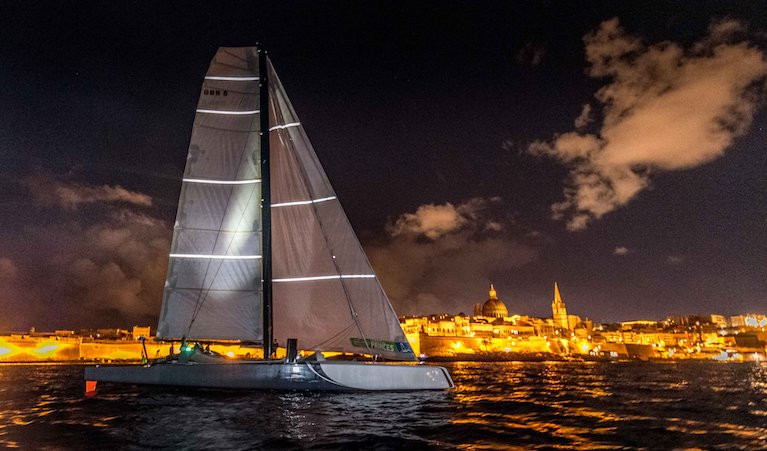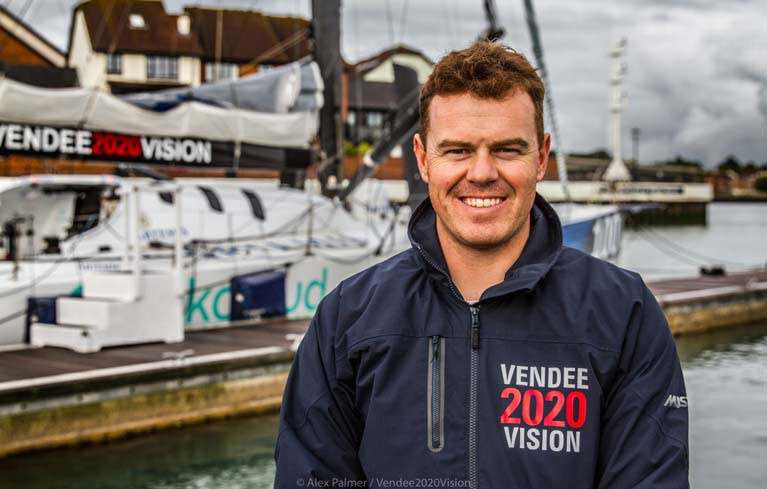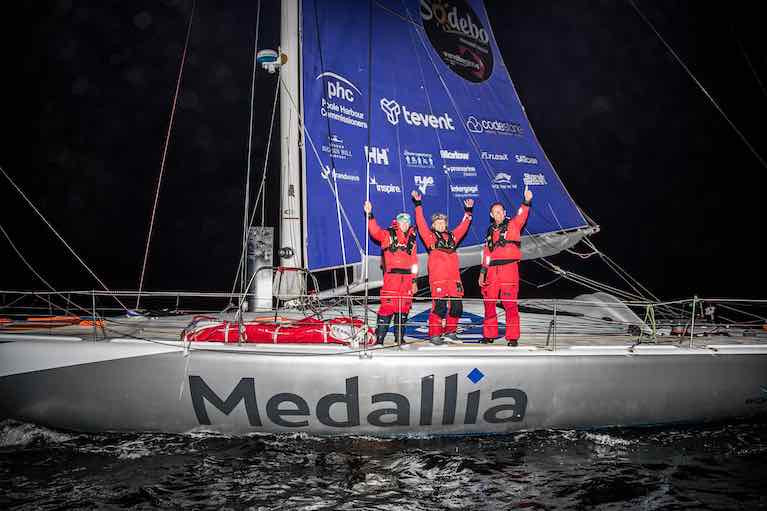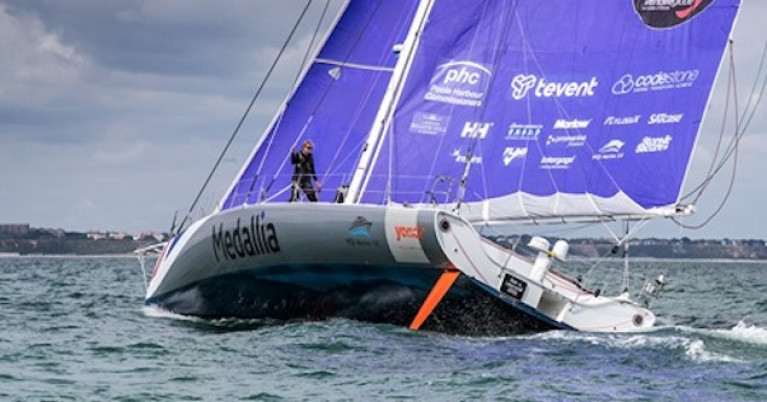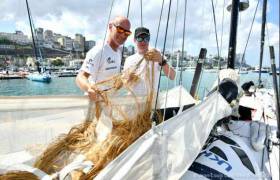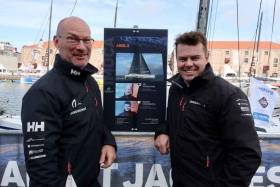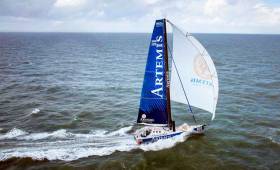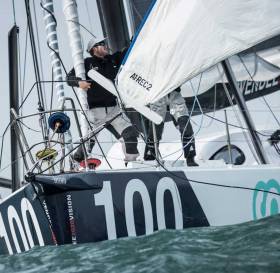Displaying items by tag: Mikey Ferguson
Middle Sea Race Mocra Division Win for Belfast Lough's Mikey Ferguson
Bangor's Mikey Ferguson has come a long way since he learned to sail at a young age in Ballyholme on Belfast Lough.
Racing with the MOD70 experts, Brian Thompson and Peter Cummings on board the Riccardo Pavoncelli owned MOD70 Mana in the Rolex Middle Sea Race, Mikey said: "Everyone had to raise their game in our crew and I think we came away with a great result and account of ourselves for our first ever race on Mana". Before the start, he had predicted a battle for line honours, as Afloat.ie reported on 17th October.
He added that it was an epic match race within sight of Giovanni Soldini's Maserati for most of the 500 miles - about 200 meters apart. The lead changed hands about 18 times, and Mikey admits that they made a small tactical mistake not to go with Maserati at the last island of the course and it cost them 5 miles. But they chased them down again to finish about 13 minutes behind at the finish, to wind the MOCRA division.
Mikey was delighted with the result and is already looking forward to next year's racing calendar in the Med. "It was great to be competitive given how little time we have had the boat this year available to sail and train on. Brian and Pete are seasoned MOD70 sailors and it showed. Everyone had to raise their game to try to match their levels in our crew and I think we came away with a great result and account of ourselves for our first ever race on Mana. We have just left Malta and are on the trip back to Cagliari to pack the boat up for the winter".
Maserati Multi70 (ITA), skippered by Giovanni Soldini, crossed the finish line of the 2020 Rolex Middle Sea Race at the Royal Malta Yacht Club to take Multihull Line Honours at 20:41:31 CEST on Monday 19th October in an elapsed time of 2 days, 08 hours 31 minutes 31 seconds.
Mana (ITA), owned by Riccardo Pavoncelli, finished fifteen minutes behind after a closely fought battle around the course.
Ferguson & Brian Thompson (Lakota round Ireland record 1993) on Mana have won the Middle Sea Race Mocra Division on corrected time by 4 minutes 23 seconds.
Belfast Lough Sailor Mikey Ferguson Racing on MOD70 in Middle Sea Race
Mikey Ferguson from Bangor on Belfast Lough was looking forward yesterday (16th) to getting going on the MOD70 Mana in the 41st Edition of the Rolex Middle Sea Race which started today from the historic Grand Harbour in Malta's capital Valletta. In light of the global pandemic, the Royal Malta Yacht Club has put in place special protocols and arrangements to ensure the safety of competitors, ashore and at sea.
Mikey is part of an Irish line up in the 70-boat fleet, as described by WM Nixon on Afloat today (17th October) here
He was hopeful of a good result on the multi-maestro Brian Thompson skippered Italian Mana, entered by Riccardo Pavoncelli. "We should do battle for line honours. The weather looks challenging and avoiding wind holes which will litter the course will the main aim. It's easier when its daylight".

Famed for its magnificent offshore race course and revered for the scale of the challenge it presents, the Rolex Middle Sea Race is one of the most prominent events on the international yachting calendar. Mikey is excited to have another Italian entry, the near sistership Multi 70 Maserati, to race against. She set the multihull record in 2016 with a time of 49hrs 25m 1s and now Giovanni Soldini and Maserati are back.
Mikey added, "There will be stiff competition too from the French 80 ft tri Ultim'emotion 2". She is entered by Antoine Rabaste and was winner of the Cape2Rio Race as LoveWater in January. He concludes "It could be a long slow race but hopefully we will avoid separation from the other big Tris and are in the mix at the end for line honours".
You can follow the race on the tracker here
Belfast Lough's Mikey Ferguson found the Lonely Rock Race on Pip Hare's Open 60, Medallia, shorter than planned due to the impending storm.
The race director decided to shorten the course with the turn at Wolf Rock off Land's End instead of the Fastnet. And the finish at Plymouth.
However, the crew, Pip, Mikey and Paul Larsen were delighted to take line honours in an entry list of 14 with an elapsed time of 41:45:36 ahead of Tom Kneen's JPK 1180, Sunrise.
Pip was delighted with the result; "Great testing the modifications to Medallia over the last few months. Also a great decision by the Race Committee to shorten the course with the forecast that was predicted. Really happy with the boat and any and all sailing done before the Vendee Globe in November is valuable".
Mikey was pleased to be on board Medallia; " Great to do some offshore sailing with a purpose again. It's been a long time. Nice that all the changes to the boat have worked well and we have a few more tweaks to do over the coming few weeks. All in all, a great shakedown and the boat should be in great shape for the Vendee in November".
Northern Ireland sailor Mikey Ferguson from Bangor in County Down has joined Pip Hare's IMOCA campaign and they will start the Lonely Rock Race tomorrow (Sunday 16th August), from near Ryde in the Eastern Solent in Medallia. As well as being a professional yachtswoman, Pip is a journalist and sailing coach. Also on board will be Paul Larsen, world sailing speed record holder.
The name 'Lonely Rock' is a loose translation of the Gaelic 'An Charraig Aonair' for the Fastnet Rock. The original course dates from 1925 when two members of the Royal Western YC in Plymouth bet on who could win a race round the landmark, starting from Ryde and finishing in Plymouth. In association with the Royal Victoria YC on the Isle of Wight, this race will leave the Scillies to port, round the Fastnet to port, pass the Isle of Scilly Isle once again to port and finish in Plymouth Sound.
 Northern Ireland sailor Mikey Ferguson
Northern Ireland sailor Mikey Ferguson
As previously reported in Afloat.ie Mikey (37) has been a competitive dinghy and keelboat sailor from a young age and has worked in the sailing industry for 20 years. He has been in various British IMOCA campaigns including Mike Golding's Ecover and Gamesa projects and he has also skippered the IMOCA Artemis 2. He was the skipper of Team Artemis Ocean Racing which broke the record in the Length of Britain Race in 2017.
The 46-year-old ocean sailor Hare plans to compete in the 2020-21 Vendee Globe race in early November in Medallia, the new title sponsor of her challenge, the San Francisco-based software company. Her previous long-distance races include last year's Transat Jacques Vabre in 2019 (24th) and the Rolex Fastnet Race (13th). In the lead up to November's departure, Pip will skipper Medallia in warm-up races, including the Lonely Rock Race and the Round the Island race.
 Pip Hare's IMOCA Medallia
Pip Hare's IMOCA Medallia
Ferguson says " I'm looking forward to joining Pip and Paul on the Lonely Rock Race. We've made a lot of changes and modifications to Medallia and this race gives us a great opportunity to test all the new mechanical, rigging and communications systems. All this is great prep for Pip and the boat for this year's Vendee Globe. With a variety of wind conditions too, this should make the course very interesting and challenging. Looking forward to actually getting back on the water racing though!".
Northern Ireland Sailor Mikey Ferguson Completes Incident Filled Transat Jacques Vabre Race
Bangor, Northern Ireland sailor Mikey Ferguson and Finnish airline pilot Ari Hussela finished the famous 4350-mile coffee route ocean race, the Transat Jacques Vabre offshore race, from Le Havre to Salvador da Bahia in Brazil, on 15th November. But not without incident writes Betty Armstrong.
As Afloat reported previously, the race was a first for the Ferguson and Hussela partnership and as reported in Afloat previously, the airline Captain is the first-ever Scandinavian skipper in the Transat Jaques Vabre. They were competing in the IMOCA class in Ariel 2, formerly known as Dee Caffari’s AVIVA, owned by Hussela.
After a good start on 27th October, and not far into the race when they were off Guernsey, a small hole appeared in the mainsail when they were taking in a reef. Under canvassed they got out of the channel safely and entered the Bay of Biscay. With the wind going forward they sail delaminated and fell to pieces and they had no means of fixing it.
”To think that after 48 hours into the race one half of my head was thinking which Port has the closest airport or should we just retire and sail under jib back to France. The other half was thinking let’s see where this journey could take us, Cascais? Madeira? Or the Canary Islands?”, says Mikey Ferguson.
They chose to keep going and Mikey felt that it would be good to get Ari out of his comfort zone and push the boat harder. They had to start with the spare main and knew there was a risk but the priority for Ari was to secure a position in the Vendee Globe ranking by stacking up the miles. “I could not be happier that we did the impossible”, says Huusela.
They finished on 15th November and it felt like a win to Hussela. Their time was 18 days 23 hours 7 mins 14 seconds, coming in at 26th in the IMOCA class.
Airbus A350 Captain Ari became the first Finnish and first Scandinavian ever to complete this legendary race. He started sailing when he was 24 and has a dream of taking part in the Vendee Globe. Ferguson (36) has been involved in this project for a year and a half. He has been a competitive dinghy and keelboat sailor from a young age and has worked in the sailing industry for nearly 20 years.
And Royal Ulster members can look forward to hearing of Mikey’s adventures at the Club night on 5th February next year.
Two Irish Skippers Among the Transat Jacques Vabre Fleet Racing Across the Atlantic
At lunchtime Transat Jacques Vabre Normandie Le Havre starting horn was sounded and the 118 skippers in their 59 multi-coloured offshore boats weaved across the start line in front of Cape de la Hève, beating into 12-14 knots of north-easterly wind. Among them are two Irish skippers Joan Mulloy from County Mayo as Afloat reported here and Mikey Ferguson in County Down here. The Irish co-skippers are neck and neck in 26th and 27th place according to rankings here.
The biennial double-handed 4,350-mile race, the longest and toughest transat in the sailing calendar, will take them to Salvador de Bahia in Brazil.
Already the race is dishing up a fair amount of drama with the news at 06:50 (UTC) this morning, while leading the Class40 fleet, British skipper, Luke Berry and his French co-skipper, Tanguy Le Turquais, informed the race management their Class40, Lamotte - Module Creation, had dismasted. The two skippers are doing well and are safe on board the boat.
At yesterday's start, Both IMOCA and Class40 fleets were tightly bunched, but line honours appeared to go to Bureau Vallée II (IMOCA) and Aïna Enfance and Avenir, the Class40 favourite.
The Route de Café is a marathon not a sprint, but the start along the coast is never simple, especially when the blood is up and adrenaline flowing in front the crowds lining the pontoons, channel, beaches and coast. Not to mention the live TV audience. And, of course, the choppy shallow sea with plenty of current against them as they race the 16 miles of coast to round the Region Normandie buoy off Étretat. The fastest among them should take a little under three hours before they turn to head west towards Cotentin under spinnaker.
There should be an intense downwind race in the Channel overnight when the wind will continue to strengthen. Through that time and the morning, as they all exit the Channel, it will be decision time as to whether to go east, west or further west. That could provide an early test of the different trajectories the latest generation foiling IMOCA may take, although Alex Thomson on Hugo Boss has said his priority is finishing not winning, especially after being helicoptered to safety when his boat capsized four years ago. Britain’s Samantha Davies, in an older boat but with hugely upgraded foils on Initiatives-Cœur, is keeping an open mind.
“Once we’re west of Ushant then we’ve got to make a decision,” she said. “I don’t want to make a decision yet because it’s not clear enough and sometimes if you decide in your head you influence yourself when you’re making further decisions.
“We’re pretty open at the moment, (laughs) we’re going to have all the sails out on the deck to work out which one we’re going to use. We are at one with Initiatives-Cœur and super happy to be finally at sea and heading for Brazil.”
The small Class40 have the same dilemma.
“Do we go west fully, for me there is still an option, but it’s a bit of a tricky one,” Luke Berry (Lamotte – Module Creation) said. “We’re still waiting for the info from our weather routers - you’re allowed a weather router before you start - so, we’ll make our decision sometime tonight. It’s not a (Class40) group decision, there are some that are going to go their own way and we’re not here to follow the others, but we’re not going to do lone cowboy either. It’s going to be more of downwind race out of the Channel, but it’s do we go up into the Celtic sea or not?
Britain’s Sam Goodchild, one of Berry’s main rivals, on Leyton, says that the risks and rewards are not clear.
“We don’t think we have to make our decision until tomorrow morning,” he said. “We’ve got all the ideas in our head, we don’t know what the risks and the gains are yet, it’s not as straightforward as if you go west, you break or you win, and if you go south you’re safe.”
There were emotional scenes on the pontoon before departure as the said goodbye to their friends, family and partners, except perhaps for Miranda Merron and Halvard Mabire, who are partners on both land and sea.
Top ten at midnight France time
Class 40
- Leyton, Sam Goodchild / Fabien Delahaye
2. Lamotte - Module Creation, Luke Berry / Tanguy Le Turquais
3. Aïna Enfance & Avenir, Aymeric Chappellier / Pierre Leboucher
4. Credit Mutuel, Ian Lipinski / Adrien Hardy
5. Crosscall Chamonix Mont-Blanc, Louis Duc / Aurelien Ducroz
6. Beijaflore, William Mathelin-Moreaux / Marc Guillemot
7. Entraide Marine-Adosm, Charles-Louis Mourruau / Estelle Greck
8. Banque Du Leman, Simon Koster / Valentin Gautier
9. Linkt, Jorg Riechers / Cedric Chateau
10. Made In Midi, Kito De Pavant / Achille Nebout
Multi 50
- Solidaires En Peloton - Arsep, Thibaut Vauchel-Camus / Fred Duthil
2. Primonial, Sebastien Rogues / Matthieu Souben
3. Groupe Gca - Mille Et Un Sourires, Gilles Lamire / Antoine Carpentier
IMOCA 60
- Banque Populaire X, Clarisse Cremer / Armel Le Cleac'h
2. Groupe Apicil, Damien Seguin / Yoann Richomme
3. Arkea - Paprec, Sebastien Simon / Vincent Riou
4. Corum L'epargne, Nicolas Troussel / Jean Le Cam
5. PRB, Kevin Escoffier / Nicolas Lunven
6. Malizia Ii - Yacht Club De Monaco, Boris Herrmann / Will Harris
7. Initiatives-Cœur, Samantha Davies / Paul Meilhat
8. Bureau Vallee 2, Louis Burton / Davy Beaudart
9. Prysmian Group, Giancarlo Pedote / Anthony Marchand
10. Hugo Boss, Alex Thomson / Neal McDonald
Bangor Sailor Mikey Ferguson Takes on Transat Jacques Vabre Race
Belfast Lough sailor Mikey Ferguson from Bangor in County Down and his Finnish co-skipper Ari Huusela will this Sunday (27th) start the Transat Jacques Vabre, one of the most spectacular of the world’s ocean races writes Betty Armstrong.
The route follows the historic coffee trading route between France and Brazil and tracks 4350 miles across the Atlantic. The race starts in Le Havre and finishes in Salvador da Bahia.
They will compete in the 30 strong IMOCA class.
The race is a first for the Ferguson and Huusela partnership. And the Finnish airline Captain is the first ever Scandinavian skipper in the Transat Jaques Vabre. Ariel2, formerly known as Dee Caffari’s AVIVA, is now owned by Huusela who started sailing at age 24. “This race is part of my 20-year dream of participating the legendary Vendée Globe. All Imoca Globe Series races are big spectacles but still I’m amazed each time. This sport is growing so fast. Large audiences follow no matter if they sail themselves or not. It must be because it is so easy and tempting to follow these true adventures digitally. No matter where you are and when you want to check the updates”, says Huusela. He adds “Mikey is a natural choice to co-skipper Ariel2 and I am delighted to race with him. We make a good combination in many ways”.
” Having sailed over 3000 miles in total with Ari we now know each other’s strengths and weaknesses. We both hope for a nice exit of the English Channel and Biscay crossing but are fully prepared for some serious weather being thrown our way. We have tweaked the boat and have had safety checks and briefings throughout the week. It still feels weird that this time I’m actually racing and not just prepping the boat, but it’s starting to feel pretty real now”, Mikey tells.
Michael Ferguson (36) has been involved in this project for a year and a half. He has been a competitive dinghy and keelboat sailor from a young age and has worked in the sailing industry for nearly 20 years. He has been in various British IMOCA campaigns including Mike Golding’s Ecover and Gamesa projects and he has also skippered the IMOCA Artemis 2 for the last five years.
The whole fleet, which also includes the Multi50 and Class40 classes, represents 12 different nationalities and it is expected there will be over half a million visitors at the event
Northern Ireland Sailors Lead in New Sailing Speed Record
Mikey Ferguson from the Royal Ulster YC on Belfast Lough and Andrew Baker from the Quoile YC on Strangford Lough have played a key role in establishing a new mono-hull record for the 620-mile course from Land’s End in southwest England to John O’Groat’s in northeast Scotland writes W M Nixon.
At first glance, the previous record - established by Phil Sharp with an Open 40 in 2015 - looked to be eminently beatable with a time of 3 days 11 hours and 52 minutes to provide an average speed of “only” 7.39. After all, the Artemis crew of Mikey Ferguson, Andrew Baker, Lizzy Foreman, and Jack Triggger (the latter recruited from the Team Concise), were racing their much larger IMOCA 60, which established a 5 day 14 hours record for the 2,000-mile Round Britain and Ireland circuit in 2014.
But the shortest course from Land’s End to John O’Groat’s takes you through all sorts of tide-riven channels – St George’s Channel and the North Channel to name only two – which can not only build up boat-breaking seas when strong winds are against the stream, but as the coast is sometimes close – sometimes very close - and frequently steep-to as well, it can play all sort of games with wind strength and direction.
Taking an Open 60 through it all at maximum speed is a bit like riding a tiger through a maze. Everything needs to be working properly, but after they’d starting zapping north from Land’s End at 1500hrs UTC last Friday (Sept. 22nd) with everything looking good for favourable and vigorous winds thanks to a deep low out beyond Ireland giving a strong southerly airstream, the wind instruments started to go on the blink.
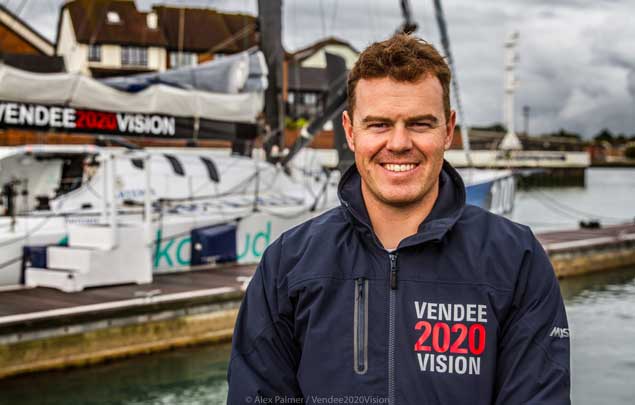 “We had to throttle back at night after the wind instruments had failed, as a crash gybe in those conditions would have been disastrous”
“We had to throttle back at night after the wind instruments had failed, as a crash gybe in those conditions would have been disastrous”
When they failed completely, Mikey Ferguson made the decision to sail during the long hours of darkness at one notch below maximum power in order to cut a bit of slack for helmsmen having to steer by feel through the long Equinoctial night – “a crash gybe would have been total disaster”.
Thus although average speed was well above the required minimum, off Wicklow Head early on Saturday morning they were making a modest 14 knots, but within two or three hours were going better past Dundalk Bay at 16.8 knot. However, sail damage and problems with the mainsail carriage made a two hour stop in flat seas a dream solution, and Mikey’s home waters of Belfast Lough came up trumps. He even brought the boat into the lough through the narrow and rocky Donaghaee Sound inside Copeland Island to save time.
A couple of hours of hectic activity off Bangor put things right. They then exited the lough in the evening past Black head at 17.3 knots - probably the best through-the-water speed achieved, for although they were showing 18.8 knots approaching Fair head, there was tide involved. They went outside Rathlin and on into a miserable night - “lousy visibility and always that fear of gybing” – to make their way out past Islay and into the Sea of the Hebrides inside the Western Isles.
By this time the real power was going out of the wind, and on Sunday evening as night drew on and they sailed past Cape Wrath, the unthinksable happened. It became totally windless. Not calm by any means, but not a breath of a breeze. They struggled across Scotland’s north coast in any scraps of wind they could find, and slowly the Orkneys came up on the port hand this (Monday) morning, and the Scottish mainland crawled by to starboard.
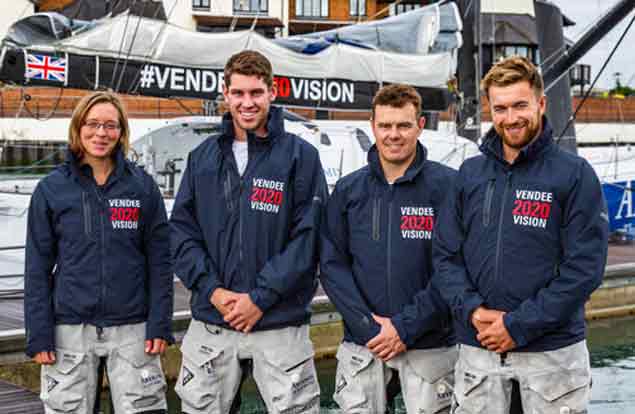 Artemis crew of Lizzy Ferguson, Jack Trigger, Miker Foreman, and Andrew Baker
Artemis crew of Lizzy Ferguson, Jack Trigger, Miker Foreman, and Andrew Baker
Ideally, to finish such a record passage with an appropriate flourish, you sweep through the Pentland Firth close past John O’Groat’s on the mainland side and Duncansby Head beyond it, with the Orkneys well away on the port hand. But in struggling to cross the virtual finish line running due north from John O’Groat’s, the Artemis crew actually found themselves well over on the Orkney side early this morning as they made it across to bring the record down to 2 days 14 hours 6 minutes and 44 seconds. They’ve taken a clean 21 hours and 44 minutes off the previous record. But as Robin Knox-Johnston said of his new Round Ireland Record in May 1986: “It’s still eminently beatable”.
Northern Ireland Sailors Mikey Ferguson & Andrew Baker Standby for Length of Britain Challenge
Four young offshore sailors, including two from Northern Ireland, Mikey Ferguson and Andrew Baker, are on standby for an assault on the Length of Britain Challenge, from Land’s End to John O’Groats. The current record held by British sailor Phil Sharp stands at 3 days, 11 hours, 52 minutes, 15 seconds at an average speed of 7.39 knots.
The team who will be racing onboard the Open 60 Artemis Ocean Racing are currently waiting for an optimum weather window for this iconic 620 nm British course. The team sails along the English & Welsh coastline westabout up to Pentland Firth on the north coast of Scotland, the final marker before the finish line off John O’Groats.
Launched in 2016, Vendee2020Vision is an initiative to nurture Britain’s Offshore sailing talent along the path to success in yacht racing’s most challenging event - the Vendée Globe, the quadrennial singlehanded non-stop round the world race. This record attempt will see the current candidates test their skills in some of the coldest and most challenging conditions off Britain’s coastline.
No stranger to setting records, in 2014 Artemis Ocean Racing took the World Record for Monohulls 60 feet and less for Round Britain and Ireland in a time of 5 days, 14 hours, 00 minutes and 54 seconds.
The crew features two of the Vendee2020Vision’s current candidates, Lizzy Foreman and Andrew Baker. They will be joined by Artemis Skipper and Boat Captain Mikey Ferguson and a new addition to the team for this record sail is Jack Trigger. Jack is one of Britain’s up and coming offshore sailing talents, and also the youngest crew member onboard. He has sailed across a variety of classes most notably he has been part of the record-breaking crew onboard the MOD70 Concise.
Alongside the assault on this British record, the team will also use this opportunity to test several pieces of wearable technology to provide vital data to assist the team in improving overall performance and health at sea. From monitoring sleep cycles and baseline vitals during an offshore race, the team will also work with Jack Trigger, a Type 1 diabetic, to see how wearable tech can assist in the management of his condition offshore.



























